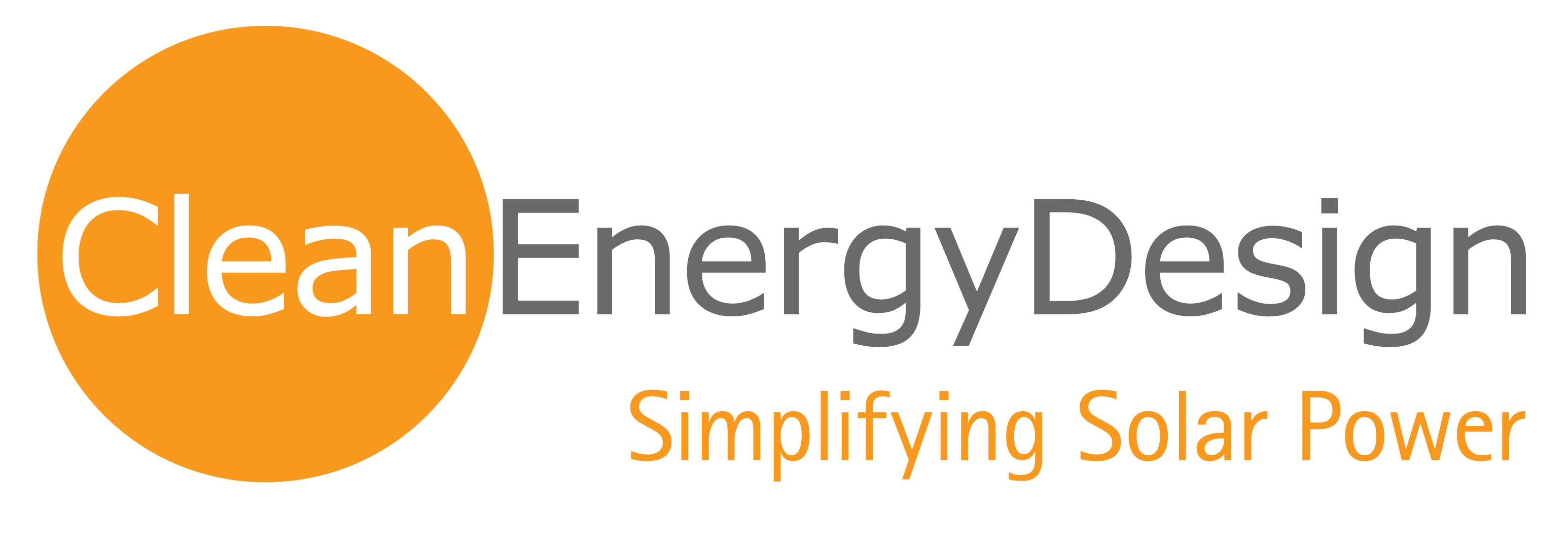Solar Energy installations are now a very attractive investment for businesses, homeowners and to outside developer/investors as well. Government incentives, rebates, tax credits and low interest financing options have made it a no brainer. Several great solar energy financing options are now available, such as state backed, low interest loans, leasing and third party financing. It is estimated that a solar PV system will add about 10% to the value of your home or business without increasing your property taxes for 20 years.
This has created a wealth of financing options for those interested in solar energy systems, who may not be able to pay for the entire system up front. They include no and low money down loans, solar leasing and power purchase agreements (PPA’s). You can either own your own system or an investor partner will be glad to own it instead. In the long run, both are a wiser financial decision than to stay completely on-grid and Clean Energy Design will help you decide which plan is right for you.
Owning Your Own Solar Energy System
Clean Energy Design will facilitate solar energy finance options for our customers who would like to own their system. We have partnerships with banks who have aggressive programs for businesses and individuals interested in solar projects. In some scenarios, you could pay nothing for 2 months and start benefitting immediately. Other traditional options are available as well.
Mass Solar Loan:
The Mass Solar Loan program provides new financing options for Massachusetts residents and homeowners to directly own solar installations. The $30 million program provides funds to banks and credit unions to create residential solar electric project loans that give more individuals the option to own solar. Mass Solar Loan also enables lenders to provide low interest rate loans and make loans available to moderate income and lower credit score borrowers. While terms may vary, lenders will offer 10-year fixed-rate loans between $3,000 and $35,000. Lenders also have the discretion of offering loans up to $60,000. The maximum interest rate for a Mass Solar Loan is 5.25 percent. Please visit MASS Solar Loan for more info.
Please email or call us for more specific information and other lending institution information.
Home Equity or Improvement Loan: Many who have equity in their homes own their own home may go to their local bank for a home equity loan.
Refinance a Mortgage: An individual, business or non-profit entity may choose to refinance the mortgage on their building and use the freed-up capital to invest in a solar system.Investor Owns Your System – Leasing or SPPAs
Power Purchase Agreements (PPAs):
A Power Purchase Agreement (or PPA) is an agreement between a host customer and a developer/investor who arranges for the design, permits, installation and maintenance of a solar energy system at no cost to the host customer. The developer then sells the power generated by that system to the host customer at a rate lower than the local utility’s retail rate which can either be fixed or rise slightly each year. The typical agreement ranges between 10 and 20 years. It is a win-win situation since the developer receives tax credits and other government incentives and receives the income that the system generates as well.
Integrated solar power purchase agreements are a popular way for customers with good credit to buy clean solar energy (at below-the-grid rates) instead of purchasing the solar equipment and maintenance packages themselves. With no capital outlay, this type of solar power financing makes your project cash-flow positive from day one.
Solar financing with PPAs work best for customers who want a $0-down option, and/or are unable or unwilling to use the Federal Investment Tax Credits (ITC) and state tax credits.
Benefits to Host Customer
No or low upfront capital costs
Reduced energy bills
Limited Risk
Developer can better leverage available tax credits
Increase in property value – 10% estimated
Option to purchase the system after 7-10 years for fair market value
Note: Generally the PPA rates are lower than the utility rate and is calculated to rise slightly over the years, but unlike utility rates, your PPA rate is pre-negotiated for the lifetime of the agreement. So, instead of paying for “dirty” grid power with rates that can go up at any time and by any amount, you’re paying for clean, renewable energy generated through your solar panels and you know exactly how much you’ll be paying for that energy for as long as the term of your agreement. If the monthly PPA payment is lower than your electric bill, a PPA makes economic sense for you. However, the financial benefit from tax credits, rebates and the sale of SREC’s will go to the system owner.
